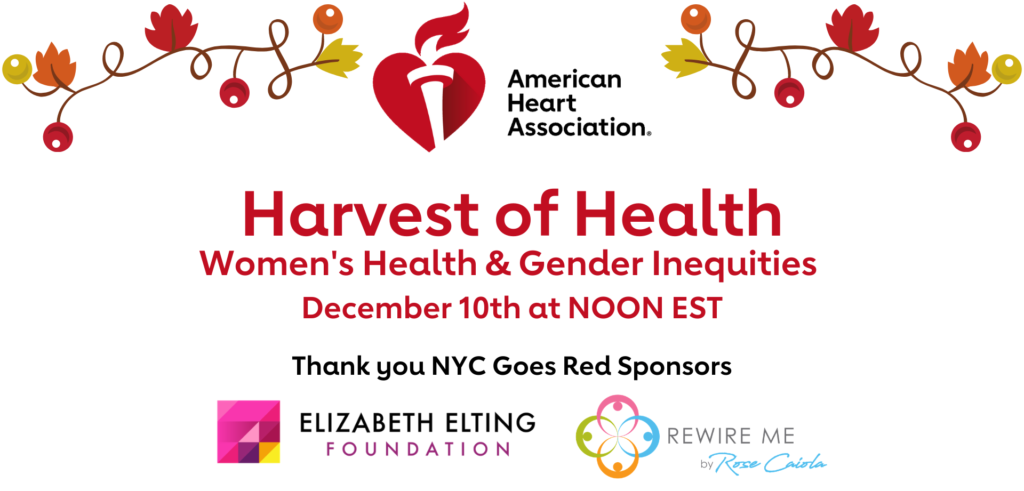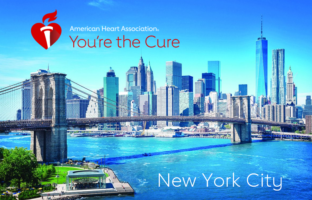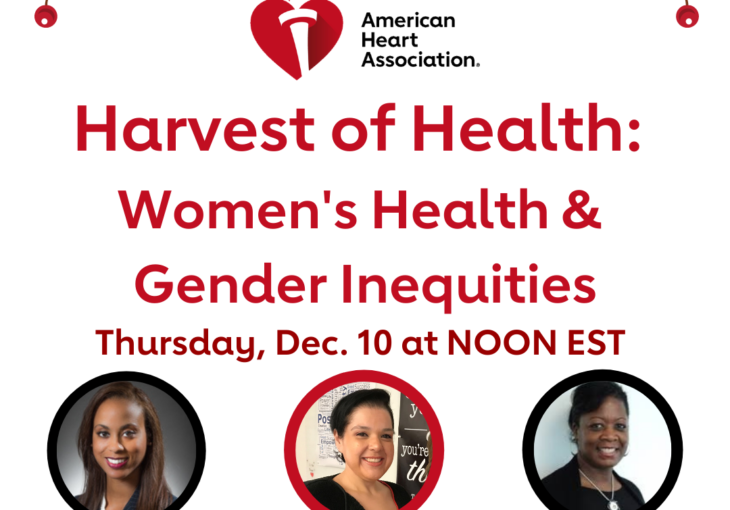Welcome to the American Heart Association in New York City’s final webinar in the Fall 2020 Harvest of Health series. The last three months have produced amazing conversation and we are thrilled to deliver this special session about Women’s Health and Gender Inequities. Women’s health touches upon a number of critical issues that intersect with many of the Association’s priorities and goals — inequities, research, access, quality of care and CPR for example. Our main goal with this companion page is to share important resources and materials to help you dive deeper into these topics, and hopefully, serve to empower you to take control of your health!
As we learned from the first two webinars, once the conversation starts flowing, time constraints may force us to accidentally skip over some of the important topics or not cover them as extensively as we would prefer. We hope you will use this page as a resource library and conversations starter.

Women’s Heart Health Overview
Heart disease is the nation’s leading killer of women. But paying attention to risk factors and living a healthy lifestyle can help keep heart disease at bay.
6 Things Every Woman Should Know About Heart Health
Warning Signs & Symptoms of Heart Attack and Stroke
Why High Blood Pressure is a “Silent Killer”
8 Steps to Prevent Heart Disease and Stroke – Infographic
Symptoms of a Heart Attack in Women vs Men – Infographic
Racial and Gender Inequity
The nation’s history of structural racism and discrimination must be acknowledged as a driver of health problems and shortened lives for Black people, other racial, ethnic and minority groups, and women.
Why is equity in women’s health important?
Structural racism is a driver of health disparities, report declares
A Presidential Advisory From the American Heart Association
COVID-19 highlights long-term inequities in some communities
Why Are Black Women at Such High Risk of Dying From Pregnancy Complications?
Why Black Cardiologists Are Vital – And Rare
Mental Health & Stress Management
We all have stress — at work, at home, and on the road. Some stress can be beneficial and may lead to actual problem-solving, but a lot of our stress is unnecessary and even harmful. It’s important to know how to manage the stress in your life.
How does stress affect the body?
Tips to Manage #StayHome Stress
Tips to Lower Stress Infographic
Fight Stress with Healthy Habits Infographic
Mental Health and Support
• National Domestic Violence Hotline 800-799-7233
• Disaster Distress Helpline 800-985-5990
• National Suicide Prevention Lifeline 800-273-TALK
CPR
Women are less likely than men to receive CPR from a bystander. More than 350,000 sudden cardiac arrests occur outside the hospital each year. Bystander CPR can double or triple a person’s chances of survival if started immediately.
Why People Fear Performing CPR on Women
Updated CPR Guidelines Address Physical and Emotional Recovery
Hands-Only CPR Instructional Video
Black Children in Poor Areas Less Likely to Get Bystander CPR
Dominic A. Murray 21 Memorial Foundation
You’re the Cure Network
The American Heart Association advocates for heart-healthy and stroke-smart communities through legislative and regulatory policies in New York City, and we need you to join us!

